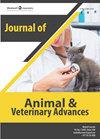Beneficial Effect of Ginger Aqueous Extract on Some Reproductive Functions in Male Rabbits
引用次数: 0
Abstract
: The aim of this study was to assess the effect of ginger on the fertility of male rabbits, in order to get benefit of its useful effect on semen quality and the reproductive performances. Twenty adult male New Zealand white rabbits (5-6 months old) and weighing (3-3.5 kg) were used. The bucks were divided into two equal groups; group A that kept as control (n = 10) and group B (n = 25) where bucks subjected to oral administration of ginger aqueous extract in a dose of 200 mg kg G 1 daily for 4 weeks. Both groups were kept under standard conditions and allowed free access to pelleted ration and water ad libitum. At the end of the experiment, semen was collected for analysis of; ejaculate volume, sperm motility, count and abnormalities. In addition, sera were used for determination of testosterone level, Total Antioxidant Capacity (TAC) and Malondialdehyde concentration (MDA). Histological examination of testes and epididymis from both groups was performed. The obtained results revealed that ginger treated bucks showed; no change in ejaculate volume, a significant increase in the individual sperm motility, sperm count with a significant decrease in the percentage of abnormal spermatozoa, a significant increase in testosterone level, TAC with a significant reduction in MDA concentration in ginger as compared with the control. The histological examination of testes and epididymis showed no abnormalities in both groups with accumulation of the spermatozoa in the姜水提物对雄性家兔生殖功能的有益影响
目的:研究生姜对雄性家兔生育能力的影响,以了解生姜对雄性家兔精液质量和生殖性能的有益作用。选用5 ~ 6月龄、体重3 ~ 3.5 kg的成年雄性新西兰白兔20只。雄鹿被分成两组;A组为对照组(n = 10), B组为对照组(n = 25),给予生姜水提物200 mg kg G 1 /天,连续4周。两组均保持在标准条件下,并允许自由获得颗粒饲料和水。实验结束时,采集精液进行分析;射精量,精子活力,数量和异常。此外,测定血清睾酮水平、总抗氧化能力(TAC)和丙二醛浓度(MDA)。两组均行睾丸和附睾组织学检查。结果表明,生姜处理的雄鹿表现出;与对照组相比,射精量没有变化,个体精子活力显著增加,精子数量显著减少,异常精子百分比显著降低,睾酮水平显著增加,生姜中TAC显著降低MDA浓度。两组睾丸及附睾组织学检查均未见异常
本文章由计算机程序翻译,如有差异,请以英文原文为准。
求助全文
约1分钟内获得全文
求助全文
来源期刊
自引率
0.00%
发文量
0
审稿时长
1 months
期刊介绍:
Journal of Animal Veterinary advances is a peer-reviewed, open-access scientific journal which publishes articles related to experiments, treatment, analysis, biological elements and other methods of research connected with veterinary. JAVA started publishing activity in 2002, since that time is updated twice a month, and is available in online and print formats. The publications are reviewed by Editorial Board in accordance with the standards and novelty of the subject, while strictly following ethical guidelines. Subject areas suitable for publication include, but are not limited to the following fields :: Veterinary science :: Animal husbandry :: Animal nutrition :: Anatomy :: Biological science :: Pathology :: Infectious diseases :: Animal physiology :: Animal breeding :: Animal biotechnology :: Transgenic animal production :: Animal parasitology :: Veterinary medicine :: Animal feed and nutrition :: Equine.

 求助内容:
求助内容: 应助结果提醒方式:
应助结果提醒方式:


